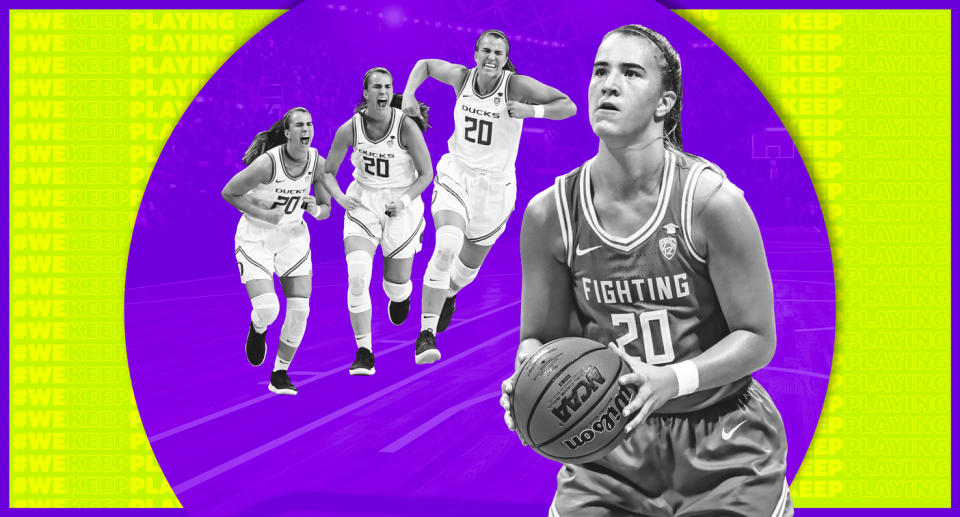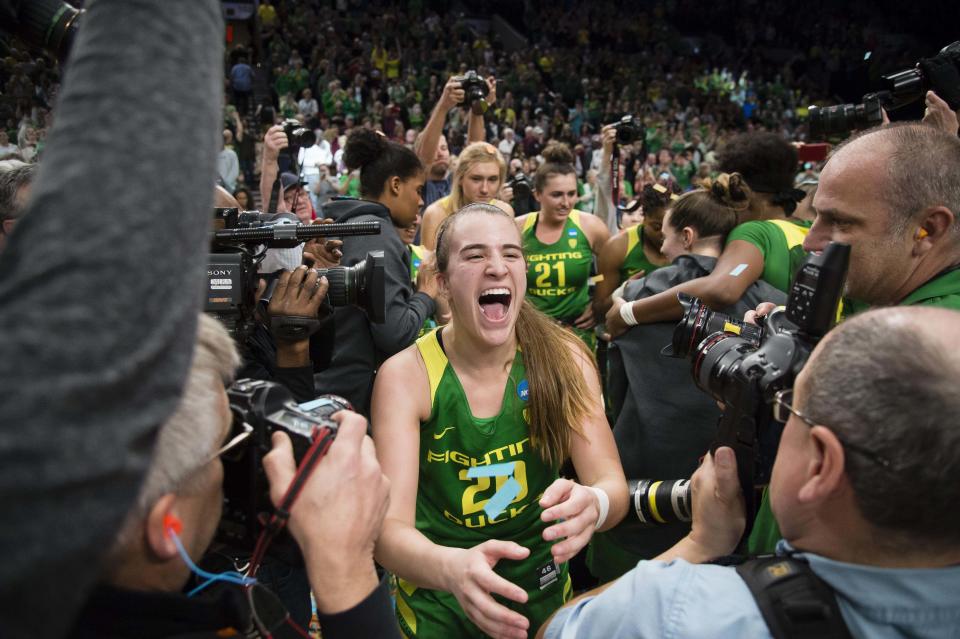Sabrina Ionescu's unique rise to fame is about to revolutionize basketball
Sabrina Ionescu doesn’t particularly enjoy talking about herself. It’s not that she’s unfriendly, or even shy. It’s just that — well, let her explain.
“I just try to represent myself to the best of my ability, just with my actions, not with my words,” Ionescu told Yahoo Sports in December. “Because I’m not one to ... ”
She cuts herself off, humility impeding full explanation.
“I don’t know, I don’t like talking about myself like that,” she concludes.
And yet these days, an endless stream of people want Ionescu to do just that. To talk, via phone or video call from her family’s Northern California home, about end-of-season honors and next week’s WNBA draft. About Oregon memories and the sudden end. About Kobe and grief. About Steph Curry and … herself.
It’s a natural consequence of a record-breaking college career, one that took the 5-foot-11 guard and her program to three Elite Eights and a Final Four. To back-to-back Wooden Awards and packed arenas. To 2,562 points, 1,091 assists and 1,040 rebounds, and more triple-doubles (26) than any other college player, male or female, ever.
In the process, she became, arguably, the most popular collegiate hooper in the country regardless of gender. “She runs in circles that I can only dream of,” Oregon coach Kelly Graves said in October. And that was before she took down Team USA, before Curry started showing up at games, before she pressured Nike into selling her jersey, and before they sold out in hours. Before Sabrinamania swept the nation.
Now, as she prepares to turn pro, industry sources expect an unprecedented shoe deal. WNBA agents see a “marketing star” and an influential voice. Ionescu will join other iconic female athletes on Saturday’s #WeKeepPlaying panel, which can be streamed exclusively on Yahoo Sports. A week later, she’ll enter the WNBA with more transformative potential than any of her predecessors.
And it is all so refreshing, so energizing, for the entire women’s basketball world, because it is organic fame. Ionescu has simply been herself. She’s been intensely human. And an unsought spotlight has followed.
“She’s just a kid who’s doing amazing things,” says Whitney Wagoner, a former NFL employee and current sports marketing professor at Oregon.
And in her authenticity, Ionescu has become the purest — and potentially the biggest — female basketball superstar.
What makes Ionescu so special?
She is not the first. Far from it. Boris Lelchitski has been representing basketball players since the WNBA’s inception in 1997, and as he points out: “There have been Lisa Leslies, and Cheryl Millers, and Taurasis, and Pondexters, and Candace Parkers, what have you. There have been star players.”
But he admits: “I think there are a few things making this, right now, different.”
Sports marketing experts agree, and point to a variety of factors that have amplified Ionescu’s popularity. It’s her basketball prowess, of course, but also her backstory. The childhood spent hustling locals for Slurpees in pickup games at a nearby park. The work ethic derived from Romanian-immigrant parents. The middle school who told her she should be playing with dolls, not an orange leather sphere.
It’s also her timing. It’s “the rise of women’s basketball and female sports in the first place,” Lelchitski says. “Cheryl Miller was equally as dominant in her day,” Wagoner points out. But in the 1980s, “We didn’t have social media, women’s basketball wasn’t on national TV.” We also weren’t having the “broader societal conversations,” as University of North Carolina professor Danielle Smith puts it, about gender equality and women in sports that we’re having today.
“I mean, we’re literally looking at lightning in a bottle,” says Thayer Lavielle, a Wasserman executive who heads the agency’s women’s sports division.
Then there are “some other sociocultural things that people aren’t super comfortable talking about,” Wagoner says. "There’s just been a lot of stigma around female athletes. Are you pretty enough? Are you too masculine?" It's far from the chief reason for any athlete's fame, she clarifies, and that doesn’t mean it should be that way. But "if what we’re talking about is marketability, and popularity ... whether we like to talk about it or not, some of those other elements are part of the mix."
And then there is the final element, the most difficult to talk about, but one of the most impactful: an unspeakable tragedy that, as former sneaker executive Sonny Vaccaro says, “brought her story to the world.”

Ionescu’s triumph after tragedy
When Ionescu heard the news of Kobe and Gigi Bryant’s deaths that Sunday in January, hours before a game in Corvallis, Oregon, she blacked out and broke down in tears. Her teammates and parents rushed to her side. Minutes before tipoff, she was still in the locker room. Somehow, she played 40 minutes, and engineered a win over rival Oregon State. But she doesn’t remember any of it. Her brain and heart and soul were processing the loss of a friend, one she’d texted and talked with regularly ever since spending time with Kobe Bryant over the summer.
Millions of American basketball fans, however, did not know this until Ionescu was introduced to them at the public memorial service weeks later. Vanessa Bryant, Kobe’s wife, had asked Ionescu to speak. She stepped to the podium at Staples Center. And “she was so eloquent, she presented herself so well, following up on what Diana [Taurasi] had said,” Vaccaro says. “She was magnificent in her sorrow.”
He’s somewhat hesitant to draw lines between such tragic circumstances and Ionescu’s popularity. Others, understandably, are too. But this, Vaccaro explains, is “the strangeness of marketing.” Marketing is about resonant moments. “The tragedy of Kobe put [Ionescu] in the spotlight. She did all those things [on the court] before the speech. She was that good. And Oregon [was] pretty damn good. [But] I witnessed it, and that’s what I felt, I felt a kinship to [Ionescu]. And my wife did. We all did. Because of the tragedy, and the way she comported herself. And then what she did that night.”
After the memorial, Ionescu hopped on a plane. She landed in San Francisco a couple hours before a top-10 showdown with Stanford. Her father picked her up at the airport and sped southeast. Again, emotions overwhelmed her. Her body was drained. Minutes before tip, she was throwing up in the locker room.
A couple hours later, she was the first 2K-1K-1K player in college basketball history, and Oregon was victorious.
“On that day, all the stars, and everything in the heavens, pointed to her,” Vaccaro says. “She had center stage.” And she graced it with humility and emotion and strength. She didn’t seize the spotlight. She didn’t take advantage of anything. “She made a human appearance that day above her athletic appearance,” Vaccaro says. “And to me, that resonated. She is really, really, really good. But she was human, she was tearful, she was sad, and she was grateful that she had the opportunity. That’s something you don’t write scripts for. That’s something – that’s who that person is. Actually, she’s been a very quiet superstar.”
She has, through it all, been Sabrina. Kobe didn’t change that, nor have Curry’s courtside appearances, nor LeBron James’ tweets. But they’ve offered exposure and visibility, experts explain. Ionescu’s Instagram following has more than tripled since the turn of the calendar year, with the steepest spike in February, around the memorial. The recognition from NBA stars, Wagoner says, “really matters.”
“One thousand percent,” Smith concurs. “It’s just transference, right? From a marketing perspective, if I’m a fan of Steph Curry, and I see him bringing his daughters to watch this amazing female athlete, and I already follow Steph, and I already admire him, then I’m more likely to be a fan. Because he’s transferring his support, and his fandom, and I’m more likely to do that myself.”
The memorial, in this light, was a sad but significant breakthrough.
“It was one of those magical moments,” Vaccaro says. “It’s like, ‘Toto, we’re not in Kansas anymore.’ We’re in another world.”

Gauging Ionescu’s starpower
It’s a world where boys and girls want a picture with her. A world where thousands of middle-aged males, some of whom have never watched a WNBA game, know her name. A world where Wagoner’s 75-year-old mother and Lavielle’s teenage sons gush about Ionescu all the same. Her popularity spans ages and races, genders and sexual orientations, any demographical divide that you might expect to delineate women’s basketball fandom.
“She definitely has been able to make that leap, from a relatively narrow group of people who are fans of collegiate women’s basketball, to mainstream ‘SportsCenter’ sports fans,” Wagoner says. “And that’s a really critical jump.”
She has dealt with the same institutionalized underexposure that all female athletes do. For all the hype, the Oregon women made five national TV appearances this past season. The men made 18. Similar discrepancies will follow Ionescu to the pros. They’re why lucrative endorsements have eluded most women’s basketball stars in the past, especially in non-Olympic years.
Yet there is a hope, perhaps even an expectation, that Ionescu will change that. She has said a shoe deal is coming, with either Nike, Under Armour or Puma, likely within two weeks. Vaccaro expects it to be worth more than any previous WNBA rookie sneaker contract. Lelchitski, the longtime agent, says a signature Sabrina shoe is a “no-brainer” for whichever apparel company does land her. (Nike is the heavy favorite.)
It is easy to forget that she’s still only 22. She may or may not develop into a multi-time MVP. She may or may not win championships. “She’s about to graduate college, and she has all the same butterflies about her future that every other college senior has,” Wagoner likes to remind people. “She’s young, and she’s got real anxieties like anybody else has, so we should be empathetic.”
But she has, organically, carved out a unique platform despite the engraved inequities. She is willing, and occasionally eager, to use her voice to challenge those inequities. She is positioned, marketing experts believe, to be the face of gender-equality campaigns and gender-neutral basketball campaigns alike. “She’s setting a new precedent,” Lelchitski says, “and can go down in history as one of the pioneers who helped change women’s sports in the long run.”
Says Vaccaro: “That platform, and her ability, is going to take it to a new level.”
Because, he explains: “Marketing is that ‘it’ thing, no matter what the hell you say. And that’s what my life has been — find ‘it.’ And she has ‘it.’ ”
Perhaps most importantly, though, “it” isn’t some contrived persona. It isn’t polarizing self-importance. It’s the opposite. It’s just … Sabrina.
“You don’t have to be anything different than who you are,” Bryant said of her, and to her, in one of his last interviews before the crash. “Because you being who you are has brought on these expectations, because that’s what you’re capable of. You don’t need to get in your own head about it, and say, ‘I gotta live up to this, live up to that.’ Just be who you are.”
Yahoo Sports’ Cassandra Negley contributed reporting to this story.
More from Yahoo Sports:



